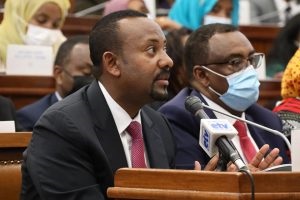BY ADDISALEM MULAT
Lately, the House of Federation welcomed its new speaker as former Amhara State Chief Agegnehu Teshager replaced Adem Farah. The House, which also presides over various key constitutional and other issues about federalism, got a new deputy speaker.
Some of the matters which fall under the jurisdiction of the House have far-reaching implications and impact on the wellbeing of the country. Besides, the House is expected to play a key role in strengthening national unity and entertaining diversity equally and democratically. Providing constitutional interpretations, resolving disputes over contested boundaries and other federalism issues require the wise decision of the House. For the House to be vibrant, its members need to have the required capacity.
As the members of the House of Federation are representatives of the various Nations, Nationalities, and Peoples of Ethiopia, they have a prestigious role to play to ensure harmony and peaceful coexistence among the people of Ethiopia.
To discharge these duties, the members should have adequate know-how and knowledge in national matters and other values of the country. Accordingly, there had been multifaceted preparations to reform its activities and discharge its mandate efficiently and effectively, ahead of the new term of the House, Capacity training has been offered to new members of the House, and the House has been putting in place reform activities to scale up its institutional capacity.
Institutional reform supported by scientific research will further strengthen the council’s constitutional mission and enhance the powers and functions of the council.
Building national unity and lasting peace, effective fiscal transition and equitable distribution of wealth, ensuring the rule of law as well as building institutional capacity are the daunting task of the House. Given its noble’s missions, the House is also expected to resolve some of the major disputes lingering long between states and also strengthen unity and tolerance among nations and nationalities.
Lately, Agegnehu Teshager, the newly appointed Speaker of the House of Federation, discussed with Aden Farah, the former Speaker of the House of Federation on the subject of issues carried out previously in the House and other major issues that need due attention. “It was stated that the House of Federation will continue to focus on issues related to conflict resolution and people-to-people ties.”
Speaking at the opening session of the House, Agegnehu said, “I believe that you can play a key role in the development, prosperity, peace, and democracy of the country in the next five years.”
Ethiopians and Ethiopian descent residing at home and abroad managed to work by the sweat of their brow by putting aside their differences to take the country to the next level of accomplishment.
He went on to note that,” The democratically elected government has tried to restructure the executive at all levels and demonstrated Ethiopia’s commitment to a new era of democracy. On top of that, we have seen the fact that it serves as a cornerstone for the strength of our national democracy and for the unity of the various Nations, Nationalities, and Peoples’ of Ethiopia.”
Generally speaking, as a country, it was an opportunity for us to achieve great victories in this challenging time. One of the signs of our victory is that we have gathered together to embark on discussing the future of our country.
He stressed that as the foundation of unity is the determination to live together, the various Nations, Nationalities, and Peoples of Ethiopia have jointly discussed and ratified the FDRE Constitution to build a democratic unity based on respect, dignity, equality, and brotherhood.
He further stressed that living together and cooperating requires acknowledging diversity. Pluralism is not a debt, but an opportunity that is well understood. Many also agree that diversity is a building block of national unity and a source of strength. Therefore, building national unity requires full rights to identities.
“In a similar vein, the constitution provides the right of Nations, Nationalities, and Peoples’ of Ethiopia to self-government. All religions and languages of all Nations, Nationalities, and Peoples of Ethiopia are equal. What is more, gender equality is respected, and all Nations, Nationalities, and Peoples are given equal representation in the House of Federation,” he continued.
“This right to equality serves as an inalienable pillar of national unity. Reasoning from this fact, to strengthen national unity in Ethiopia, it is necessary to ensure the sovereignty of the identities, give fair representation at all levels of government and strengthen political, economic, social and cultural ties between them.”
One of how the rule of law prevails in a country is when the government, government bodies, and citizens are determined and upheld under the rule of law, and basic human rights are guaranteed.
In the preamble of the FDRE Constitution, the rule of law is crucial for the building of our country with the determination to use our right to self-determination, build lasting peace, secure and economic development in Ethiopia, and build a political community based on the rule of law and our free will.
“Lack of rule of law undermines the will of the people and undermines the foundations of unity. One of the powers and functions vested in the House of Federation by the Constitution is to “promote and develop unity based on the consent of the people,” he added.
The new members of the House of Federation are responsible for upholding the rule of law and ensuring the rights and equality of the people.
The Ethiopian Herald October 17/2021


